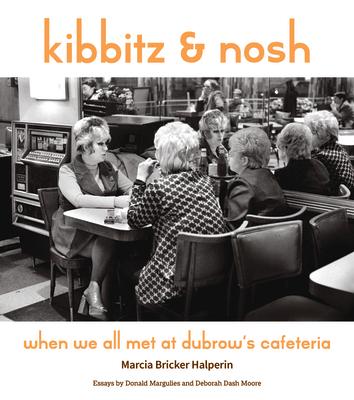On a winter's day in the mid-1970s the photographer Marcia Bricker Halperin sought warm refuge and, camera in hand, passed through the revolving doors of Dubrow's Cafeteria on Kings Highway. There, between the magical mirrored walls and steaming coffee urns, she found herself as if on a theater set, looking out at a tableau of memorable Brooklyn faces. Enchanted, Halperin returned to Dubrow's again and again.
In Kibbitz & Nosh, Halperin reminds us of the days when she would order a coffee, converse with the denizens of Dubrow's on Kings Highway and at its Manhattan location in the Garment District, and in that relaxed atmosphere execute candid photographs. In keeping with the work of Vivian Maier and Robert Frank, these black-and-white images taken during the waning days of New York City's legendary cafeteria culture are revealing and empathetic.
Dubrow's was a restaurant-cum-social club for a generation of New Yorkers; it was a place to chat with friends, an escape from the confines of the family apartment, and a space to dream while looking out onto the traffic on Kings Highway and Eastern Parkway in Brooklyn or Manhattan's Seventh Avenue. Beyond Dubrow's on the sidewalks and in the streets, the gritty and fantastic New York of the 1970s appears, ready to come through the revolving doors to order a coffee and a blintz.
The Pulitzer Prize-winning playwright Donald Margulies and the lauded historian of the Jewish-American experience Deborah Dash Moore provide essays that illuminate and contextualize Halperin's poignant photographs. Kibbitz & Nosh, with a whiff of nostalgia and full of incisive visual commentary, is a revealing return to this lost third place, the essential cafeteria.
